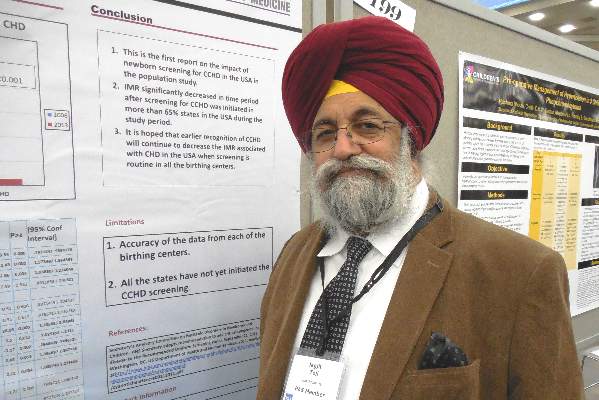AT THE PAS ANNUAL MEETING
BALTIMORE (FRONTLINE MEDICAL NEWS) – The mandate to screen all U.S.-born neonates for critical congenital heart disease that started in 2011 has had an apparent effect on infant mortality.
By 2013, national U.S. data showed that the number of U.S. infants who died attributable to congenital heart disease had dropped by a small but statistically significant percentage, compared with a reference year prior to initiation of the mandate, 2006, Dr. Jagjit S. Teji reported in a poster at the annual meeting of the Pediatric Academic Societies.
“This is the first report on the impact of newborn screening for critical congenital heart disease,” said Dr. Teji, a neonatologist at Northwestern University in Chicago.
He analyzed birth and death records from the U.S. National Center for Health Statistics and calculated that infant mortality in 2013, compared with 2006, included roughly 100 fewer infants deaths attributable to congenital heart disease, a statistically significant difference, after adjusting for differences in variables between the 2 years that could affect mortality, including gestational ages at delivery, birth weight, maternal age, race, ethnicity, and marital status. The decrease occurred despite an overall increase in U.S. births of about 8% from 2006 to 2013.
In 2013, the rate of infant mortality was 0.027%, while in 2006 it was 0.032%, Dr. Teji reported. The decrease that appeared attributable to early screening for critical congenital heart disease was especially notable because by 2013 only two-thirds of states had a rule in place mandating newborn screening following the 2011 recommendation from the Department of Health & Human Services to U.S. clinicians to noninvasively measure blood oxygenation levels in the upper and lower limbs of newborns, using pulse oximetry, Dr. Teji said. By April 2016, this had grown to 48 states with mandates for newborn screening of critical congenital heart disease, usually performed just before newborns are discharged or after they are 24 hours old. Idaho and Wyoming are the exceptions.
Dr. Teji had no relevant financial disclosures.
On Twitter @mitchelzoler




